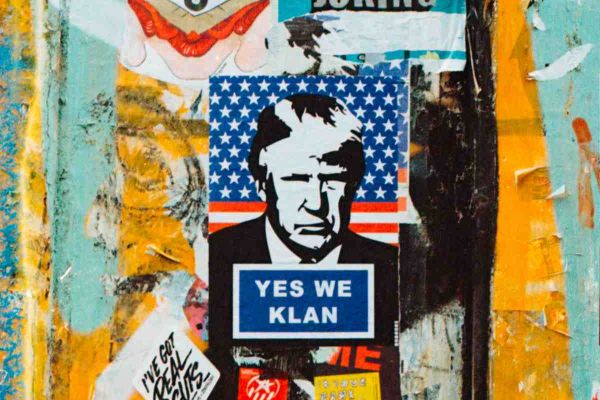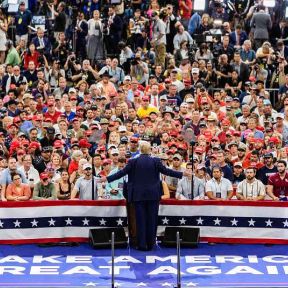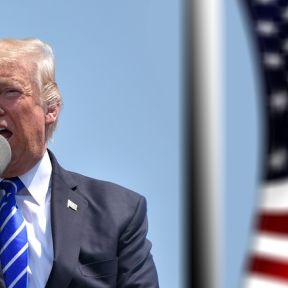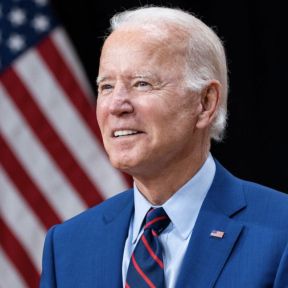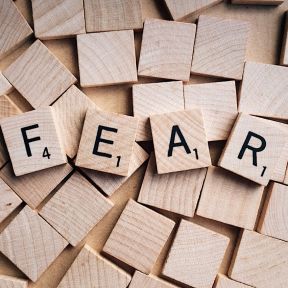
President Donald Trump
President Donald J. Trump has completely upended traditional ideas about leadership and politics. In doing so, he has sparked tremendous psychological interest—from the traits of his character, to the emotions he elicits from the public, to the point at which mental health becomes a question of national security.
Contents

President Trump has defiantly flipped the presidential script, making chaos and deliberate combativeness the new normal of White House operations, manifest in hostile briefings, high rates of staff turnover, and cultural exchanges that appear aimed at dividing the nation.
There is widespread debate about the degree to which Trump should be held directly or indirectly accountable for changes in civil discourse, with some citing his rhetoric and policies as a spur to hate crimes while others claim he has been unfairly demonized by the press.
Millions of people around the country and the globe have expressed bafflement at the nature of the personality at the center of it all, and many are alarmed by tactics and policies that appear not only erratic but often retrogressive and undermining of long-established democratic practices. Chief among them is a well-documented distortion of facts if not outright lies about everything from crowd size at the inauguration to discussions with foreign heads of state.
Throughout his term, a large segment of the population sought to quell their emotional reactivity to the chaos of the presidency and to rationally navigate the civic, legal, and ideological battles that play out daily, from Twitter to the federal courts.
President Trump is like no other leader the nation has elected—bold, impulsive, turbulent, and divisive, with no political experience whatsoever. The traits most people value in a leader, research suggests, include intelligence, diligence, humility, honesty, and compassion. Fewer people prefer a “strongman” leadership style that encompasses selfishness, aggression, and manipulation (although this preference can diminish with time under such an administration). President Trump’s ability to frame himself as a populist, and succeed with authoritarian traits, has altered the template for leadership.
The president’s falsehoods have fundamentally shifted society’s relationship with the truth. Past politicians have lied—but the Trump administration eroded the very notion that an objective truth exists. Instead, people seem to think that they’re entitled to their own truths. In addition to President Trump’s rhetoric of “fake news” and “alternative facts,” this shift is due to factors such as the creation and calcification of information silos and the evolution of the ability to believe things that can’t be seen.
America has been growing more polarized for years. Yet the Trump era seemed to lead to a new peak of polarization. The public now clashes so strongly over the leaders and values of political parties that people may embrace or dismiss a claim based solely on their political affiliation. This concept, known as tribalism, is on the rise, and both liberals and conservatives show this tendency, research suggests. The psychological factors that fuel tribalism include distrusting others based on past experience, avoiding criticism from one’s own political party, and protecting one’s ego from admitting a mistake or holding a contradictory position.
President Trump has cultivated a strong and dedicated base of supporters. This has prompted some psychologists to wonder if these voters share any similarities. Research suggests that support for President Trump may be associated with a preference for authoritarianism, a preference for group hierarchies in society, less contact with people outside of one’s in-group, and feeling a sense of deprivation relative to others.
President Trump and his defenders have suggested that some of his opponents behave in a way they characterize as "Trump Derangement Syndrome" or TDS. They say that President Trump’s actions trigger people to have distorted opinions, extreme emotions, and hysterical behaviors. (The same language was used previously to describe reactions to Presidents Bush and Obama.) However, Trump Derangement Syndrome is not a real, diagnosable, or treatable mental disorder. Opponents have responded that TDS is a term used to discredit and delegitimize criticism of the president.
The campaign and election of President Trump led counselors, clinicians, and life coaches to report that their clients were developing anxiety, depression, paranoia, hypervigilance, intrusive thoughts, difficulty concentrating, trouble sleeping, and nightmares. The intense political anxieties also altered how mental health professionals practice: In striking contrast to decades of precedent, some therapists now choose to make their political opinions known to their clients.
In addition to exploring specific concerns in therapy, skills for coping with election anxiety include joining communities that reaffirm your personal values, reaching out to friends and family for support, writing down different possibilities and the probability of each one actually occurring, journaling, exercising, and appreciating your resilience by recalling past experiences of adversity.
Political polarization is nothing new, though the passions Trump arouses extend beyond the usual divide. Many people are still fumbling for ways to cope with political ruptures in their relationships. And part of what makes it uniquely challenging is that they're basing their views on differing facts.
But a few expert guidelines can help protect relationships: approach others with openness and curiosity rather than accusations and judgment, acknowledge the different life experiences that lead people to form their beliefs, and recognize that if a conversation went poorly in the past it will probably go poorly again so avoid the topic entirely.
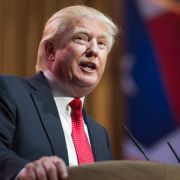
Trump’s manifest grandiosity and disregard for facts, beginning with failure to accept clear evidence about the size of the crowd attending his inauguration, has put mental health professionals in the spotlight from Day One of his presidency.
Psychologists and commentators from all ideological camps early converged on a label of narcissistic personality disorder as the condition that “explains” Trump’s behavior. Among those making this assertion are more than 70,000 mental health professionals who signed a petition warning of Trump's potential dangerousness, despite longstanding professional injunctions against "diagnosing" public figures whom experts have not personally examined.
Americans remain divided as to how authoritarian or grandiose Trump may or may not be, as well as who has the authority to make clinical pronouncements or draw historical parallels.
At some as-yet-untested point, the clinical becomes the constitutional. The behavior of President Trump has sparked both legislative action and public discussion about whether and when to invoke the 25th Amendment to the Constitution, which calls for the orderly transfer of power when a president becomes temporarily or permanently incapacitated.
President Trump’s persona—outlandish, brash, and belligerent—compels attention and analysis, especially since he occupied tremendous power. For psychologists, his persona also invites interpretation because it maps so well onto many well-known psychological constructs. Some mental health professionals have publicly stated their view that Trump’s behavior aligns with the criteria for narcissistic personality disorder, antisocial personality disorder, and paranoid personality disorder, according to the DSM-5.
In July 2020, President Trump’s niece and a clinical psychologist Mary Trump published the book Too Much and Never Enough: How My Family Created the World's Most Dangerous Man. Mary Trump writes that Trump’s mother was self-focused and absent, while his father lacked emotion and empathy. She argues that Trump had no role model for vulnerability, empathy, and reciprocity, and that displaying those traits was dangerous in the family’s household. President Trump tried to win his father’s approval throughout his life, which Mary Trump claims may inform the way he relates to certain world leaders today.
The Goldwater Rule states that psychiatrists should not diagnose a public figure unless they have personally examined that figure or have consent to discuss the figure’s mental health. This rule was established by the American Psychiatric Association in 1973 as a response to the presidential campaign between Barry Goldwater and Lyndon Johnson in 1964. Fact Magazine had asked psychiatrists if Goldwater was psychologically fit to be president, and their opinions sparked controversy and criticism, as well as a lawsuit from Goldwater.
Many mental health professionals have abided by the Goldwater Rule throughout the Trump presidency. Others have voiced their opposition and shared their perspective on President Trump’s mental fitness through the book The Dangerous Case of Donald Trump: 27 Psychiatrists and Mental Health Experts Assess a President and other platforms.
Psychologists clashed in their response to President Trump. Many spoke out despite the Goldwater Rule: Psychologist John Gartner began with a petition, signed by thousands of mental health professionals, declaring that Donald Trump must be removed from office because he has “a serious mental illness that renders him psychologically incapable of competently discharging the duties of President of the United States” and later founded the advocacy organization Duty to Warn.
Others in the field vehemently disagree with the decision to diagnose President Trump. Psychiatrist Allen Frances, who helped write the DSM-5, argues that President Trump is a threat to democracy but one that needs to be addressed politically rather than psychologically. Diagnosing President Trump based on public behavior alone is inadequate because forces such as political motivation could be driving such behavior and that behavior may not be causing distress or impairment, he argues.
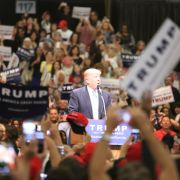
Trump’s presidency has given rise to heated discussion about a range of psychological phenomena, well beyond the debate about his own personality. The term “gaslighting” refers to the manipulative attempt to make people question their own perceptions or memory, and it has often been invoked to describe Trump’s actions and statements, especially those about “fake news.”
The question of whether or not Trump’s style could accurately be characterized as authoritarian has sparked analysis of other world leaders, past and present. Whatever one’s position on Trump and his policies, a narrow area of agreement for most Americans is that the political climate has never been more corrosive and that it reflects, to a greater or lesser degree, Trump’s contrarian approach to leadership.
Gaslighting is a form of psychological manipulation that leads someone to doubt their experience of reality. Through consistent lying, misdirection, and contradiction, the gaslighter attempts to delegitimize the victim’s beliefs by confusing and destabilizing them. This can lead the victim to doubt their memory, perception, and sometimes even sanity.
President Trump has lied brazenly to the public throughout his term. Early examples include alleging that he had the largest inauguration day audience despite photographic evidence and dismissing Russian interference in the 2016 election as “fake news” despite a consensus from U.S. intelligence agencies. Trump’s frequent and bold lies, and his consistent effort to undermine people’s perception of truth, have led some to characterize Trump’s behavior as gaslighting.
Donald Trump’s political career was in part launched by promoting a conspiracy theory—that Barack Obama was not born in the United States. Throughout his term in office, Trump continued to embrace conspiracy theories, from claiming that Barack Obama had ordered FBI surveillance of the Trump campaign to refusing to disavow QAnon, the belief that a cabal of pedophiles is working to undermine the president. Conspiracy theories have generally been relegated to select corners of the Internet, but Trump has amplified them through the power of the presidency—lending dangerous claims a wider reach and greater credibility.
Anyone can fall down the rabbit hole of a conspiracy theory. Yet conspiracy thinking is correlated with certain personality traits, including low levels of trust, an increased need for closure, and feelings of powerlessness, low self-esteem, and paranoid thinking. Conspiracy theories also proliferate during times of crisis, which characterizes the last year of the Trump presidency, from the COVID-19 pandemic to the economic recession and racial reckoning.
The Dunning-Kruger effect is a cognitive bias in which people overestimate their knowledge or ability in a specific area. This tends to occur because a lack of self-awareness prevents them from accurately assessing their own skills. For example, a tone-deaf singer may be unable to distinguish her talent from that of the greatest stars—leading her to believe that she is equally gifted. Donald Trump seems to have unwavering confidence, despite instances in which he seems uninformed about policy. This dichotomy has led some to discuss the interesting phenomenon of Dunning-Kruger.


